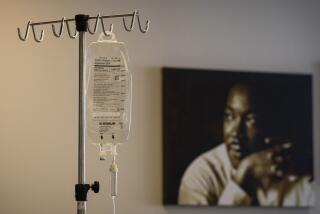Quality of care often depends on what ails you
- Share via
You’ve heard it before: Americans have the best medical care in the world. We are constantly reminded of this, in news stories about life-saving medical “miracles” or TV ads for drugs that promise the moon. And the U.S. spends more money on health care than any other country. So doesn’t it follow that our care must be good?
Not necessarily, according to a study reported in he New England Journal of Medicine last month. The chances of Americans getting proper care for a particular ailment is only about 50-50, the study found. Researchers at the Rand Corp., a nonprofit research institute based in Santa Monica, concluded that the quality of medical care you receive depends on your illness.
The researchers reviewed medical records of some 7,000 adults in 12 metropolitan areas of the U.S., comparing the care they received for one of 30 medical conditions with the best medical practices that physician organizations have developed through the years. Optimal care would include medical protocols and guidelines for the screening, diagnosis and treatment for those 30 conditions.
The results varied widely. For example, the study found that patients with eye cataracts were receiving 79% of the appropriate care for their condition, while people with alcohol dependence were getting only 11% of optimal care. Patients with coronary artery disease received 68% of the recommended treatment. For example, only 45% of heart attack patients received beta blocker medications, which have been shown to significantly reduce the risk of death over the long term.
The Rand study, the largest and most comprehensive look at health quality in the U.S. to date, focused only on basic treatment and prevention for such conditions as hypertension, hip fractures and diabetes. It did not examine such controversial technologies as body scanning.
“Even in the best cases, we found gaps,” said Elizabeth McGlynn, the study’s lead author. For example, for prenatal care and treatment for breast cancer, patients were getting only about three-quarters of the recommended treatment. Although it would be unrealistic to expect that all patients would receive every treatment, McGlynn said, it would be optimal if people received 90% of the appropriate care.
The Rand report isn’t the first study to find deficiencies in medical quality. A recent federal study, for example, found shortcomings in treatment for congestive heart failure for Medicare patients in California. The study, based on data for 2000 and 2001, found that only 66% of California patients were getting recommended tests for heart function and only 70% were receiving drugs known as ace inhibitors, a recommended treatment that is effective in reducing the risk of death from the disease. (The study by the Centers for Medicare & Medicaid Services looked only at Medicare patients not enrolled in HMOs.) Why do the numbers tell such a dismal story?
For a variety of reasons, many of the most effective medical technologies and treatments are not used, says Dr. Michael Rich, a cardiologist at the Washington University School of Medicine in St. Louis. That’s especially true of preventive and screening procedures. Doctors in the U.S., he says, are trained to focus on the sickest patients, those who are seriously ill and less so on those with chronic illness. Physicians practicing in groups with fewer than five doctors pose another barrier to high-quality care, health experts point out. Most physicians rely on memory and training to make the correct decisions, but with the explosion in medical knowledge and new technology, memory and training may not always be enough.
When patients suffer from multiple conditions, treatment issues get more complicated for doctors. Someone with congestive heart failure may have several other illnesses that physicians must know about and treat. When care must be coordinated among several doctors, sometimes the right thing isn’t done. When doctors practice in teams and large groups, there’s a better chance that one of the physicians will know the right treatments.
The way physicians are paid is another problem, says Dr. Carolyn M. Clancy, director of the federal Agency for Healthcare Research and Quality. “The big dollars are in doing [medical] procedures. If I’m a cardiologist, I devote a lot of my time and attention to procedures that pay better.”
Clancy says doctors are paid the same whether they provide good or bad care. That is beginning to change in California. Starting next spring, the six largest health plans in the state, including Blue Cross and Health Net, have promised to pay millions of dollars in additional fees to physician groups that can demonstrate improvements in preventive services and treatment of the chronically ill.
Along with the right incentives, doctors must do a better job of involving patients in their own care. A group of doctors in Portland, Ore., for example, is making use of electronic medical records and communicates with patients through newsletters and e-mail. Special health coordinators are available to answer patient questions day or night. When patients call, a receptionist asks “How can I make your day easier?” Have you heard that from your doctor’s office lately?
*
Trudy Lieberman can be reached by e-mail at trudyal530@aol.com.






